Or:
Portugal and the one-drop rule
Below, (1) my abridgement of Ray Smith’s The Black Man’s Gift to Portugal from “The Best of Attack and National Vanguard Tabloid,” Ref: Issue No. 6, 1971; (2) Arthur Kemp’s more recent views on Portugal in March of the Titans; (3) the comments of John Martínez whose native language is Portuguese, and (4) my impressions on Iberian miscegenation.
Ray Smith
In view of the fact that we are now being forced to integrate with the Negroes and grant them equal participation, it might be instructive to look at other countries which have integrated with Negroes in the past to see what the Negroes gave them. What is the historical evidence?
There is a wealth of material here for study in such places as Haiti, Cuba, Puerto Rico, Brazil, etc., but the nearest parallel to the United States today is Portugal in the 16th century.
It may come as a surprise to hear of the Negroes’ role in the history of Portugal, for in spite of all the emphasis on “Black studies” in our schools, no one seems to talk about the Blacks’ contribution to Portugal—neither the Portuguese, the Blacks, nor our modern historians who are rewriting our history books to make the Negroes look good. It takes considerable digging in books written before our modern era of forced integration to uncover the story of Portugal.
Poets and explorers
By the middle of the 16th century, Portugal had risen to a position analogous to that of the United States today. Portugal was the wealthiest, most powerful country in the world, with a large empire and colonies in Asia, Africa and America. The Portuguese people were, like the Elizabethans in England, poets and explorers, a race of highly civilized, imaginative, intelligent, and daring people. They showed great potential and had already made important contributions to the Renaissance. But, unlike England and other European countries, Portugal had a large and rapidly growing Negro population and, at the same time, its white population was declining.
Portugal began the Negro slave trade after encountering Negroes in its explorations and forays into Africa. Portugal brought the first Black slaves to Lisbon in 1441, and they continued to be imported in such numbers that by 1550, the population of Portugal [especially in Lisbon] was 10 percent Negro (the U.S. is 13-14 percent Negro today).
Defilement of the blood
There was no taboo or injunction against sexual relations with the Negroes, and the Negroes blood soon became assimilated into the general population through miscegenation, so that today there are no Negroes, as such, in Portugal. The present-day population of Portugal is described by the New York Times Encyclopedic Almanac, 1971, as follows: “Ethnic Composition: The people are a mixture of various ethnic strains, including Celtic, Arab, Berber, Phoenician, Carthaginian, Lusitanian, and other racial influences. The present population is one of the most homogeneous in Europe, with no national minorities.” (Note that the Negro strain is not listed by the New York Times).
What you can see in Portugal today is the product of uniform, non-selective mixing of the 10 percent Negroes and 90 percent Whites into one homogeneous whole. In effect, it is a new race—a race that has stagnated in apathy and produced virtually nothing in the last 400 years.
The Encyclopedia Britannica, 11th ed., 1911, in its article on Portugal states, “The Portuguese intermarried freely with their slaves, and this infusion of alien blood profoundly modified the character and physique of the nation. It may be said without exaggeration that the Portuguese of the ‘age of discoveries’ and the Portuguese of the 17th and later centuries were two different races.”
The contribution of this new race to civilization in terms of literature, art, music, philosophy, science, etc. has been practically nothing. Portugal today is the most backwards country in Europe…
Portugal and America
In spite of the close similarity between the situation of Portugal in the 1550’s and the United States today, we cannot predict that the outcome of our racial integration with Negroes will be exactly the same. The historical significance, however, is that any country, society, or group which has integrated to any appreciable extent with the Negroes has suffered drastically in its ability to maintain a civilized standard of living and its ability to compete with others. There is no evidence that any other country ever gained anything from integration with Negroes.
It should be pointed out that the Negro-White ratio, 1:9, in Portugal in the 1550’s does not represent the final percentage of Negro genes, for the Negro element was rapidly increasing while the White element was declining. The male Whites were leaving Portugal in large numbers—sailing, settling in the colonies, and marrying native women (the government encouraged this). Most of the Negro slaves brought to Portugal were adult males. The population was thus unbalanced—an excess of White women and Negro males, and a shortage of White men. Chronicles of the era relate that Portuguese women kept Negro slaves as “pets”. They also married them.
The situation in the U.S. today is not too different. The radical-chic Whites have their Black pets.
Our percentage of the Negro element today does not represent the final amalgam. The Negro birth rate is almost twice as high as that of the Whites. There is no White population explosion in America, or anywhere in the world. It is all colored. The colored woman has the children; the White women are on the pill or have abortions.
What the final amalgam in America will be we can not say, but if the present trends continue, the Negro element will be much more than 14 percent.
Why did Portugal integrate?
The British, French, Dutch, Spanish, and Portuguese all engaged in the Negro slave trade, but only Portugal brought them to their own country. The question arises—why did Portugal so willingly accept racial integration with Negroes while other European countries kept the Negroes out and maintained their racial integrity? What was the climate of opinion, the current ideology, teaching, or propaganda that led the Portuguese to depart from the behavior of the other countries? What was the difference about Portugal?
You will not find the answer to these questions in our modern history books and recently published encyclopedias, for the whole subject of the decline has become taboo. You will have to dig into older sources and discover your own answers.
You might also ask yourself why America is accepting racial integration while most of the rest of the world is “racist.” Why are we different?
History rewritten
Our encyclopedias and history books have been purged and rewritten. If you look up Portugal in the 1970 edition of the Encyclopedia Britannica, you will not find anything about the role of the Negroes and Jews in the history of Portugal, or anything about the decline and fall of Portugal.
The Jews are briefly mentioned among others who “exerted various influences over the territory which in the 13th century acquired the frontiers of modern Portugal.” There is no elaboration of what this influence was.
The Negroes have been eliminated entirely. They are not listed with the other ethnic groups in the ancestry of the Portuguese people. In the entire 15-page article, there is no clue that Negroes were ever present in Portugal or that they had any role or influence in Portuguese history.
The 1970 edition of the Encyclopedia Americana also makes no mention of the presence of Negroes in Portugal.
In all these sources you find “facts,” i.e., names and dates, but with no meaning and no indication of what actually happened or why. However, if you can manage to find some older sources, you can learn a great deal about the history of Portugal.
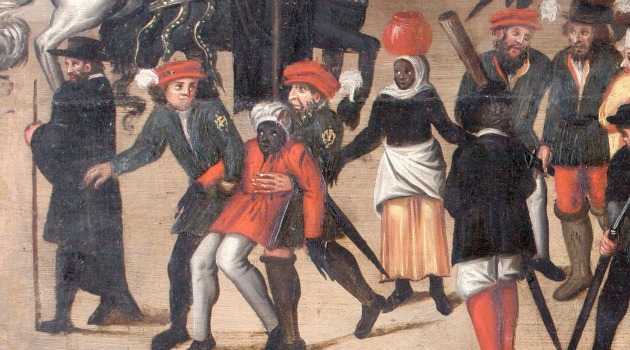
Blacks and Jews: Jewish police officers
haul away a black man
in this anonymous depiction
of a Lisbon street scene
(Walters Art Museum, Baltimore)
The article on Portugal in the 1911 edition of the Encyclopedia Britannica contains more real information than you can get in reading a hundred history books of more recent vintage. From our modern point of view, this article would probably be called “racist,” but the point is that the presence and activities of the Negroes and Jews are recorded. The information is there, and you can draw your own conclusions. The article is actually pro-Jewish. There is also a scholarly analysis of the factors in the decline and fall of Portugal, with the author tending to blame the Inquisition, the Jesuits, and anti-Semitism. However, neither his conclusions nor his bias prevents him from including factors or information which might lead the reader to a different conclusion.
Our modern scholars and authorities eliminate information which might lead the reader to the “wrong” conclusion.
Suppressing the evidence
The 1964 edition of the Encyclopedia Britannica still briefly lists the Negroes and Jews, along with others, as Portuguese racial elements, but with no details or elaborations. By 1966, the Negroes have vanished completely.
Now, what has happened between 1911 and 1966 that makes us purge and rewrite history in such a way? Have we decided that race no longer is, or ever was, a factor in history? This cannot be, since “Black Studies” are flourishing at our universities. Historians are supposedly trying hard to discover all they can about the role of the Negroes in history.
In a trial, a lawyer tries to suppress evidence that would be damaging to his client. He tries to prevent this evidence from reaching the jury. Our modern historians and scholars are trying to suppress evidence. The Negro is their client. We are the jury—and we must not reach the “wrong” verdict.
Liberals in the United States often became very self-righteous and superior when the former Soviet Union purged and rewrote its encyclopedias, eliminating from its history current undesirables and making them “unpersons.” We ridicule their lack of objectivity and irrational scholarship.
But we do exactly the same thing when we rewrite history of Portugal and make “unpersons” of the Negroes (and Jews). In terms of rewriting and deliberately falsifying history, we are much closer to Orwell’s 1984 than the Soviet Union ever was. Big Brother protects us from dangerous knowledge.
Quo Vadis, Aryan man
There is a great need for the American people to know what happened in Portugal in the 16th century, for we are repeating their experience. We are in the same predicament, at the same juncture, at the same crossroads in history. There is an amazing similarity between our situation today and Portugal’s in the 1500’s. Shall we take the same road?
Travelers from other European countries were amazed to see so many Negroes in 16th-century Lisbon, as are travelers today in Washington, D.C. Our own capital is a large percentage Black, and, as was the case in Lisbon, the Negroes do all the manual labor and service jobs. The 1911 Encyclopedia Britannica comments, “While the country was being drained of its best citizens, hordes of slaves were imported to fill the vacancies, especially into the southern provinces. Manual labor was thus discredited; the peasants sold their farms and emigrated or flocked to the towns; and small holdings were merged into vast estates.”
Manual labor has been “discredited” for many White people these days, and Negroes fill these jobs. We are “too good” for it.
Stout hearts—and pure blood
In analyzing the catastrophe which befell Portugal, the historian H. Morse Stephens (in his book, Portugal, written in 1891) concludes:
They [the Portuguese] were to produce great captains and writers, and were able to become the wealthiest nation in Europe. But that same sixteenth century was to see the Portuguese power sink, and the independence, won by Alfonso Henriques and maintained by John the Great, vanish away; it was to see Portugal, which had been one of the greatest nations of its time, decline in fame, and become a mere province of Spain. Hand in hand with increased wealth came corruption and depopulation, and within a single century after the epoch-making voyage of Vasco da Gamma, the Portuguese people, tamed by the Inquisition, were to show no sign of their former hardihood. This is the lesson that the story of Portugal in the sixteenth century teaches: that the greatness of a nation depends not upon its wealth and commercial prosperity, but upon the thews and sinews and the stout hearts of its people.
This is rather old-fashioned language, but what Stephens is saying is that, by the end of the 16th century, the quality of the people was lacking. Other European nations suffered military defeat, but continued to grow and develop. Portugal stopped dead in its tracks. It had nothing to build on. Portugal can now only look nostalgically to the past. We Americans must use this information as insight into our future. It is too late to save the White Aryan people of Portugal, but we must save ourselves.
Arthur Kemp
Lessons in decline: Spain and Portugal
Spain and Portugal are two countries in Western Europe which have both been marked by phases of great wealth and power and then decline—the classic characteristics of the rise and fall of civilizations. Bearing in mind the lessons already manifest from the ancient civilizations, it is therefore easy to look for the population shifts which, as always, closely track the rise and fall of all civilizations. As to be expected with both Spain and Portugal, the population changes are also evident—and are also directly linked to the leading and then reduced roles these nations have played in not only White history, but also of world history.
♣
One of the first laws which the Gothic kingdom in Spain established was a ban on all mixed marriages. Goths were only allowed to marry Goths, and punishment for violating this ban was burning at the stake.
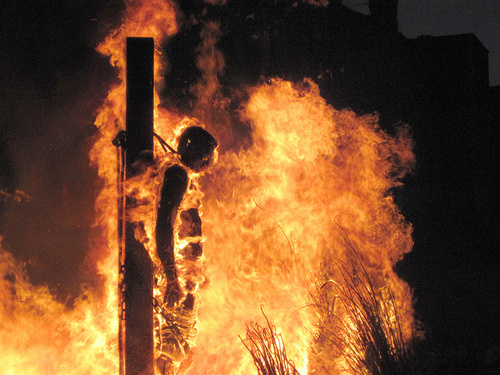 This overtly racial law kept the intermixing of Goths with all others to an absolute minimum—and particularly with the growing Jewish population. Gothic Spain settled down into a period of relative peace and resultant prosperity, with the only discordant note being sounded by the large Jewish population.
This overtly racial law kept the intermixing of Goths with all others to an absolute minimum—and particularly with the growing Jewish population. Gothic Spain settled down into a period of relative peace and resultant prosperity, with the only discordant note being sounded by the large Jewish population.
[However], partly because of a fanatic Christianizing zeal (which was common to all early Christians), partly because of Jewish domination of the Spanish financial world, and partly because of the exclusivity and separation which the Jewish religion gave to the Jews, ill feeling between the Christian Goths and Jews in Spain reached a height which had not been seen since the time of the Roman-Jewish war 550 years previously.
In 620 AD, the Spanish Gothic king, Sisbert, ordered 80,000 Jews to be baptized as Christians in an attempt to break Judaism in Spain. This was the start of the Conversos—Spanish Jews who publicly espoused Christianity but in secret kept up Jewish traditions. They were also known by the less complimentary name of “Marranos”—pigs.
Although the 80,000 Jews baptized by Sisbert remained in Spain, about an equal number left Spain for other parts of Europe to escape the growing anti-Semitic feeling in Iberia. Their departure was not a moment too soon—fifty-three years later, in 673 AD, another Spanish Gothic king, Wamba, formally expelled all Jews from Spain who would not convert to Christianity.
Wamba’s immediate predecessor, King Recesuinto [Recceswinth], had taken a step which was to have far reaching consequences. He abolished the long standing ban on mixed marriages, replacing it with a law stating that anyone of Christian beliefs was allowed to marry anyone else of similar beliefs. Henceforth the only ban on intermarriage would be on religious grounds, not racial.
This step allowed any person of any racial origin, as long as they professed Christianity, to intermarry and mix with the Goths. In this way the first steps were taken that would lead towards the dissolution of the Gothic tribe in Spain.
[In his book Kemp proceeds to describe the following centuries, then he writes of Spain’s Golden Age:]
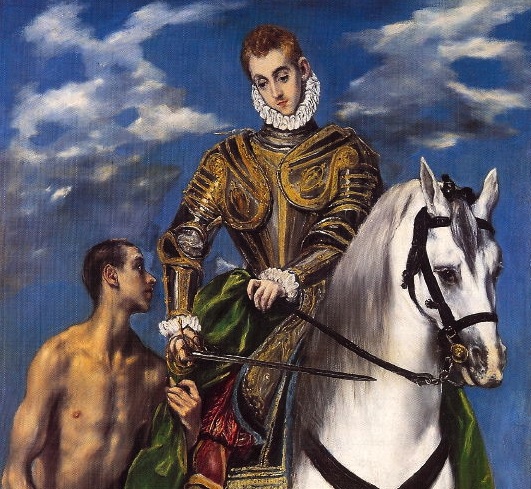 The racial divisions emerge. This famous painting by El Greco, (1548 -1614), Saint Martin and the Beggar, is a vivid depiction of the emerging division of Spain into those who had mixed with the non-White Muslims and those who had not. Saint Martin is portrayed as completely White. The beggar is clearly of mixed race.
The racial divisions emerge. This famous painting by El Greco, (1548 -1614), Saint Martin and the Beggar, is a vivid depiction of the emerging division of Spain into those who had mixed with the non-White Muslims and those who had not. Saint Martin is portrayed as completely White. The beggar is clearly of mixed race.
The change in the racial face of Spain, combined with its disastrous European wars, brought about that country’s decline as a great power, perfectly in line with the law that societies create cultures in the image of their populations, and change those societal norms as their populations change. Spain is a significant example of this principle, because, like Italy after the Germanic Lombard invasion, that country essentially became a bi-racial nation: White in the North, with a gradually darkening population to the south.
By 1648, Spain had been so weakened that it conceded Dutch independence in that year. French provinces were handed back to France in 1659, and Portugal was once again granted independence in 1668.
In 1497, the Portuguese King, Emanuel, mirrored the Spanish example and expelled non-Christian Jews and all Christianized Moors. A law was also introduced which forbid persons of mixed race from holding public office—the law had as its formal title the “Purity of Blood Law” [Limpieza de sangue]. In addition to this, similar restrictions were placed on what was called “New Christians”—Jews who had converted to Christianity to avoid persecution by the Inquisition, which also reached into Portugal.
[In Portugal] there were no social restrictions on the Black population, and intermarriage was as frequent as not. Over the passage of time, the entire Black population was completely absorbed into the Portuguese population, to the point where by the start of the 20th Century, there were no full-blooded Blacks left in Portugal at all.
 While not every Portuguese person today is a product of this absorption process, it is true to say that a very large number of Portuguese today are in fact of mixed racial descent, with a small amount of Moorish blood, dating from that non-White race’s occupation of the Iberian peninsula, thrown in for good measure.
While not every Portuguese person today is a product of this absorption process, it is true to say that a very large number of Portuguese today are in fact of mixed racial descent, with a small amount of Moorish blood, dating from that non-White race’s occupation of the Iberian peninsula, thrown in for good measure.
 The absorption of the ten percent Black population into the Portuguese population also identically mirrors the disappearance of Portugal as a world power. The Portuguese of the Age of Discoveries and those of today are essentially two different peoples. The effects of the absorption of the Black slaves has retarded Portugal’s history ever since. The rapid decline of Portugal following the intake of the vast numbers of Black slaves mirrors her decline.
The absorption of the ten percent Black population into the Portuguese population also identically mirrors the disappearance of Portugal as a world power. The Portuguese of the Age of Discoveries and those of today are essentially two different peoples. The effects of the absorption of the Black slaves has retarded Portugal’s history ever since. The rapid decline of Portugal following the intake of the vast numbers of Black slaves mirrors her decline.
In 1580, Spain annexed Portugal after the Portuguese king died heirless, and only regained its independence in 1680 once Spain itself had also gone into decline for precisely the same reasons—although the admixture of Black slaves into Spain was never as far reaching as it was in Portugal.
After 1600, Portuguese domination of trade with the East Indies was lost to the Dutch and the English. Partly in response to objections from the mixed race element in society, and partly in response to the reality that many Portuguese citizens were already of mixed racial heritage, the Purity of Blood Law was repealed in 1773, the same year that slavery was abolished in Portugal itself, and the restrictions on the “New Christians” (the Jews) in that country, were lifted.
Portugal’s dramatic and extremely quick decline from the most powerful and richest country in Western Europe to the most backward and poor country in that region, contains an extremely significant lesson. It only required an influx and absorption of just over ten per cent of non-White blood into mainstream Portuguese society to cause a significant shift in population make-up of that country. This shift in make-up immediately affected Portugal’s position and status in the world, with its decline being clearly linked to the absorption process.
John Martínez
I’ve just read the article about Portugal you sent me the other day [Ray Smith’s, abridged above]. It’s awesome, very educative.
I think you remember that I said [in a previous email] that in 19th-century Portuguese novels you never see Blacks in the plots. Despite that, I also said that there is something weird about the Portuguese as far as race is concerned, because those folks are palpably more stupid than other Europeans by and large, and I went on to mention that in Southern Portugal the Arab/Northern African racial admixture with the locals through the centuries probably had been considerable. Now, do you remember a post you prepared for your blog, concerning the frailty of the White genetic material, whose good qualities are lost by any minimum admixture with non-white genetic input? I found it so striking I even translated it and posted it on my blog.
Well, if you put together all these data I think you have a reasonable explanation for what happened to Portugal: Until the 14th century, there had been some Arab/North African amalgamation in the south, but the north remained more or less intact. In the course of the 15th century, due to Portugal’s conquests in Africa, dozens of thousands of Negroes were brought to the country, especially to Lisbon. Since there had never been anything like a racial consciousness in Portugal, racial amalgamation was rife and unchecked. Then, after a few generations, the country imploded economically and became the cultural/economic backwater we see today, especially if we keep in mind that the Black influx into Portugal most likely went on for the following centuries.
In other words, the one-drop rule should indeed be heeded. A relatively small-level racial intermixing on the part of the Portuguese was enough to destroy their character as a White people, even if not enough to give the average Portuguese of today a distinctively Black/Arab/Northern African phenotype.
Choices have consequences indeed…
♣
As soon as I started reading those online articles [critical of both Smith and Kemp’s views on Portugal] I realized they were the work of Portuguese antifas who call Kemp a racist and, paradoxically, at the same time try hard to prove their country is not a Negroes’ nation. Pathetic.
The passage you sent me from Wikipedia says everything, and I’d like to draw your attention to the following data:
In Iberia the mean frequency of Haplogroup L lineages reaches 3.83% and the frequency is higher in Portugal (5.83%) than in Spain (2.90%) and without parallel in the rest of Europe. [emphasis added]
Now, and this is really important, you can’t lose sight of something: since the slave traffic into Portugal must have ended at some point between the 18th and 19th century, in the meantime (at least until the 1960’s and 70’s, when apparently there was a resurgence of African Black immigration into the country), the amount of Black blood among the general population necessarily decreased over time. Therefore, this 5.83% mentioned above certainly was an even higher figure a couple of centuries ago. And now that Blacks are once more migrating en masse to Portugal, the risk they might run of becoming a White nation again in the future has definitely been removed.
About the allegations one of the articles tries to make to the effect that Portugal is no backwater, that it has a vibrant culture which unfortunately is not given attention by the big media… bull. Ever since Camões, arguably the greatest European poet in the 16th century after Shakespeare, the only relevant contributions the country has given to Europe are 19th-century novelist Eça de Queiroz and 20th-century poet Fernando Pessoa. It is true that the insufferable José Saramago won the Nobel Prize for Literature in 1998, but so what? Even Toni Morrison won it—although Tolstoy, Joyce and Borges didn’t. In fact, I’m surprised Paulo Coelho hasn’t received it yet. The antifas in Stockholm will bestow prizes to their brothers anyway and commie Saramago would do just as well as any other.
My 2 ¢
Before discovering white nationalist literature I was completely unaware that the Portuguese ruined their gene pool by interbreeding with Blacks. And I ignored also that the Spanish had imported vast amounts of Black slaves into New Spain—presently Mexico—and that with time the Blacks merged genetically with the Amerind mestizos.
But what shocked me the most is that long ago the pure Aryans in Spain—by 476 AD a Visigoth king, Euric, controlled nearly all the Iberian Peninsula—were tricked into degrading their gene pool by means of Christian conversion and marrying non-whites, as explained by Kemp (and William Pierce).
Incidentally, in the first comment of the comments section below I reproduce the whole section on current Iberian genetic studies that Martínez used to pick a quotation. I am reproducing it in addition to linking to it above because in the past I endured the bitter experience of Wikipedia administrators deleting an entire section I had written about aboriginal infanticide in Australia in spite of the fact that it was well sourced. The article “Genetic history of the Iberian Peninsula” at Wikipedia could be censored as well.
He who controls the past controls the future! Rewriting history is therefore one of the hobbies of our anti-white culture.
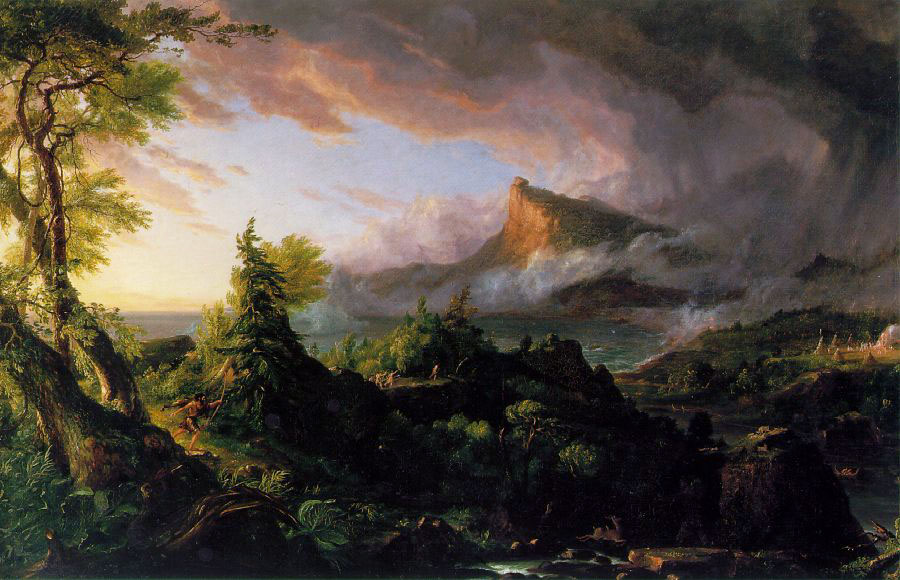
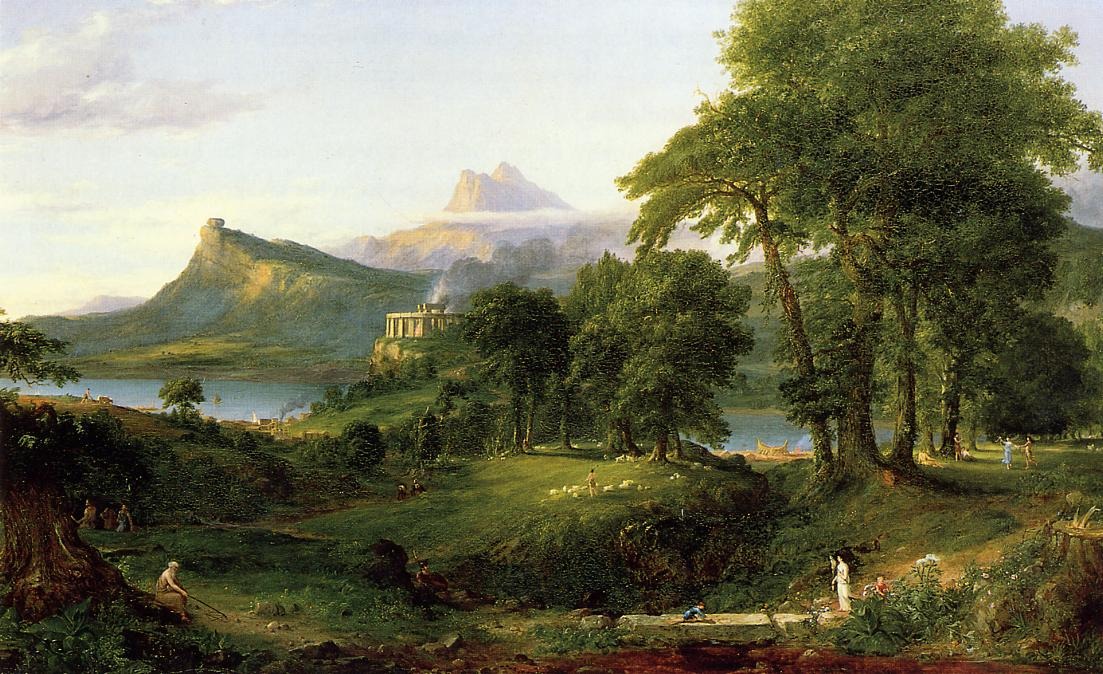
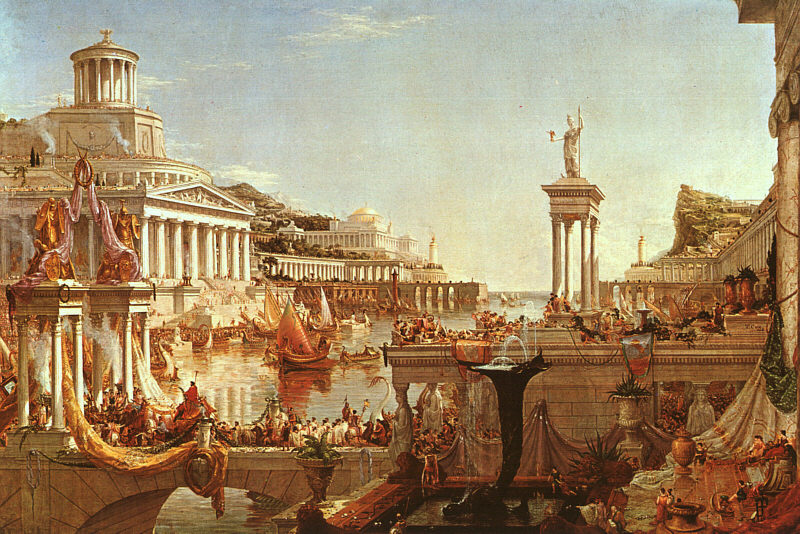
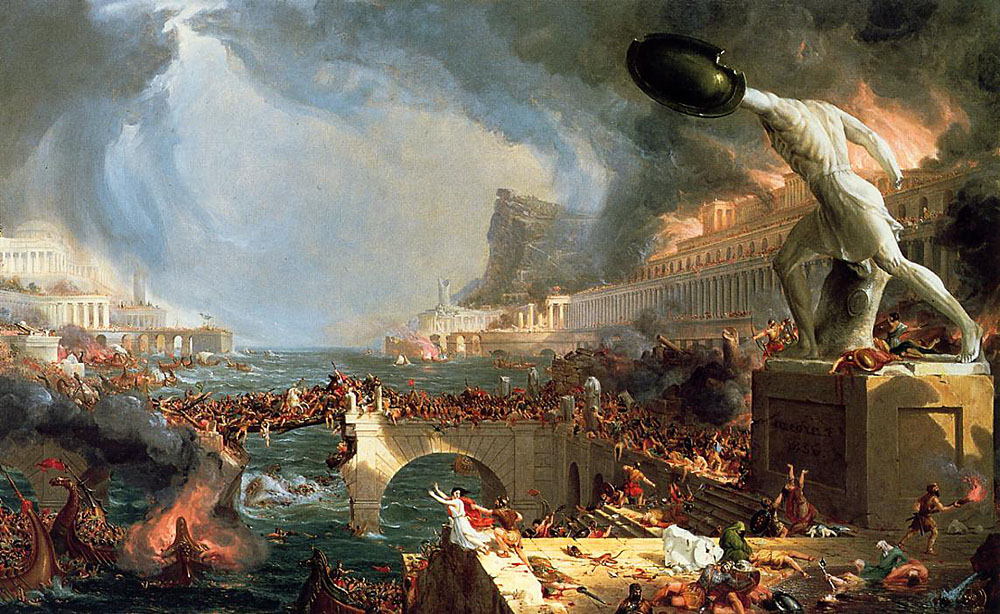
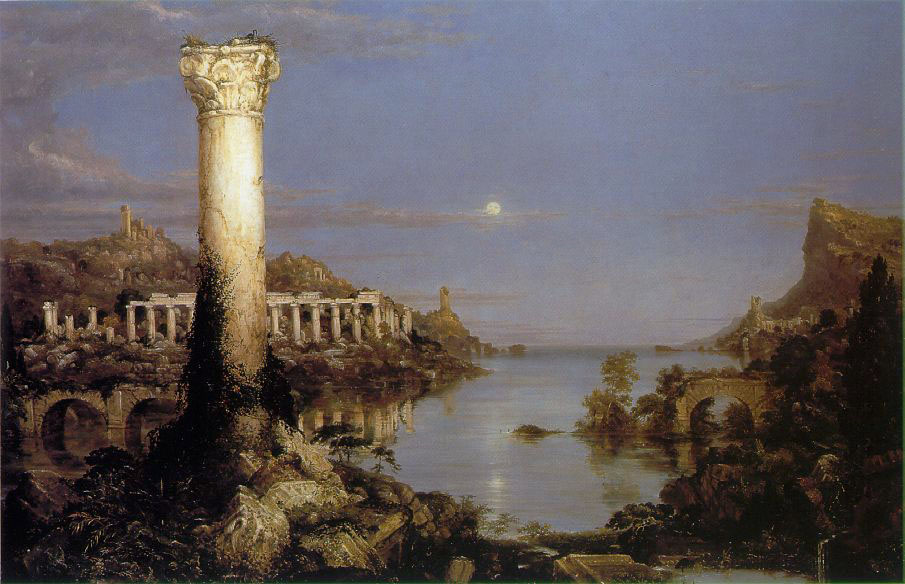

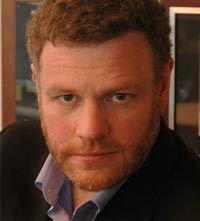



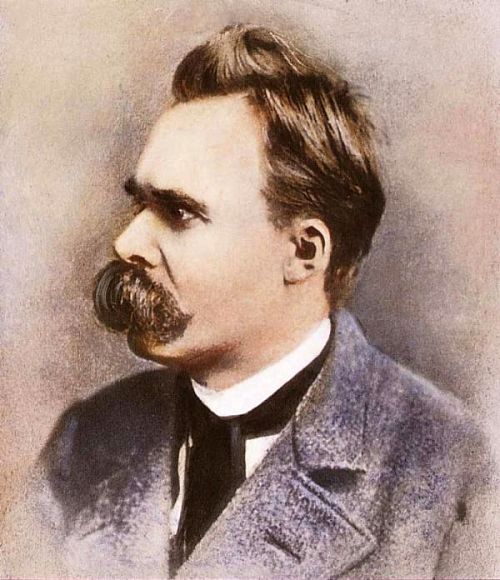
 I guess it’s also a form of mental escapism and suppression of uncomfortable truths and traumatic historic memories. Feeling victimized isn’t a good feeling. That might be another reason why the official narrative is so successful and why there’s a total disconnect with our past and people even identify with the Allied occupants, thus all this talk about “liberation” or Germans watching Tarantino’s movies like Inglorious Basterds and cheering while Germans get slaughtered on screen.
I guess it’s also a form of mental escapism and suppression of uncomfortable truths and traumatic historic memories. Feeling victimized isn’t a good feeling. That might be another reason why the official narrative is so successful and why there’s a total disconnect with our past and people even identify with the Allied occupants, thus all this talk about “liberation” or Germans watching Tarantino’s movies like Inglorious Basterds and cheering while Germans get slaughtered on screen.



